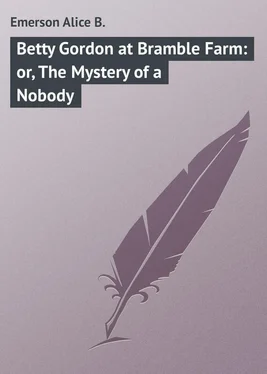Alice Emerson - Betty Gordon at Bramble Farm - or, The Mystery of a Nobody
Здесь есть возможность читать онлайн «Alice Emerson - Betty Gordon at Bramble Farm - or, The Mystery of a Nobody» — ознакомительный отрывок электронной книги совершенно бесплатно, а после прочтения отрывка купить полную версию. В некоторых случаях можно слушать аудио, скачать через торрент в формате fb2 и присутствует краткое содержание. Жанр: foreign_prose, foreign_children, на английском языке. Описание произведения, (предисловие) а так же отзывы посетителей доступны на портале библиотеки ЛибКат.
- Название:Betty Gordon at Bramble Farm: or, The Mystery of a Nobody
- Автор:
- Жанр:
- Год:неизвестен
- ISBN:нет данных
- Рейтинг книги:4 / 5. Голосов: 1
-
Избранное:Добавить в избранное
- Отзывы:
-
Ваша оценка:
- 80
- 1
- 2
- 3
- 4
- 5
Betty Gordon at Bramble Farm: or, The Mystery of a Nobody: краткое содержание, описание и аннотация
Предлагаем к чтению аннотацию, описание, краткое содержание или предисловие (зависит от того, что написал сам автор книги «Betty Gordon at Bramble Farm: or, The Mystery of a Nobody»). Если вы не нашли необходимую информацию о книге — напишите в комментариях, мы постараемся отыскать её.
Betty Gordon at Bramble Farm: or, The Mystery of a Nobody — читать онлайн ознакомительный отрывок
Ниже представлен текст книги, разбитый по страницам. Система сохранения места последней прочитанной страницы, позволяет с удобством читать онлайн бесплатно книгу «Betty Gordon at Bramble Farm: or, The Mystery of a Nobody», без необходимости каждый раз заново искать на чём Вы остановились. Поставьте закладку, и сможете в любой момент перейти на страницу, на которой закончили чтение.
Интервал:
Закладка:
Alice B. Emerson
Betty Gordon at Bramble Farm; Or, The Mystery of a Nobody
CHAPTER I
WAITING FOR WORD
"I do wish you'd wear a sunbonnet, Betty," said Mrs. Arnold, glancing up from her ironing board as Betty Gordon came into the kitchen. "You're getting old enough now to think a little about your complexion."
Betty's brown eyes laughed over the rim of the glass of water she had drawn at the sink.
"I can't stand a sunbonnet," she declared vehemently, returning the glass to the nickel holder under the shelf. "I know just how a horse feels with blinders on. You know you wouldn't like it, Mrs. Arnold, if I pulled up half your onion sets in mistake for weeds because I couldn't see what I was doing."
Mrs. Arnold shook her head over the white ruffle she was fluting with nervous, skillful fingers.
"There's no call for you to go grubbing in that onion bed," she said. "I'd like you to have nice hands and not be burnt black as an Indian when your uncle comes. But then, nobody pays any attention to what I say."
There was more truth in this statement than Mrs. Arnold herself suspected. She was one of these patient, anxious women who unconsciously nag every one about them and whose stream of complaint never rises above a constant murmur. Her family were so used to Mrs. Arnold's monotonous fault-finding that they rarely if ever knew what she was complaining about. They did not mean to be disrespectful, but they had fallen into the habit of not listening.
"Uncle Dick won't mind if I'm as black as an Indian," said Betty confidently, spreading out her strong little brown right hand and eyeing it critically. "With all the traveling he's done, I guess he's seen people more tanned than I am. You're sure there wasn't a letter this morning?"
"The young ones said there wasn't," returned Mrs. Arnold, changing her cool iron for a hot one, and testing it by holding it close to her flushed face. "But I don't know that Ted and George would know a letter if they saw it, their heads are so full of fishing."
"I thought Uncle Dick would write again," observed Betty wistfully. "But perhaps there wasn't time. He said he might come any day."
"I don't know what he'll say," worried Mrs. Arnold, her eyes surveying the slender figure leaning against the sink. "Your not being in mourning will certainly seem queer to him. I hope you'll tell him Sally Pettit and I offered to make you black frocks."
Betty smiled, her peculiarly vivid, rich smile.
"Dear Mrs. Arnold!" she said, affection warm in her voice. "Of course I'll tell him. He will understand, and not blame you. And now I'm going to tackle those weeds."
The screen door banged behind her.
Betty Gordon was an orphan, her mother having died in March (it was now June) and her father two years before. The twelve-year-old girl had to her knowledge but one single living relative in the world, her father's brother, Richard Gordon. Betty had never seen this uncle. For years he had traveled about the country, wherever his work called him, sometimes spending months in large cities, sometimes living for weeks in the desert. Mr. Gordon was a promoter of various industrial enterprises and was frequently sent for to investigate new mines, oil wells and other large developments.
"I'd love to travel," thought Betty, pulling at an especially stubborn weed. "I hope Uncle Dick will like me and take me with him wherever he goes. Wouldn't it be just like a fairy story if he should come here and scoop me out of Pineville and take me hundreds of miles away to beautiful and exciting adventures!"
This enchanting prospect so thrilled the energetic young gardener that she sat down comfortably in the middle of the row to dream a little more. While her father lived, Betty's home had been in a small, bustling city where she had gone to school in the winter. The family had always gone to the seashore in the summer; but the only exciting adventure she could recall had been a tedious attack of the measles when she was six years old. Mrs. Gordon, upon her husband's sudden death, had taken her little daughter and come back to Pineville, the only home she had known as a lonely young orphan girl. She had many kind friends in the sleepy country town, and when she died these same friends had taken loving charge of Betty.
The girl's grief for the loss of her mother baffled the villagers who would have known how to deal with sorrow that expressed itself in words or flowed out in tears. Betty's long silences, her desire to be left quite alone in her mother's room, above all her determination not to wear mourning, puzzled them. That she had sustained a great shock no one could doubt. White and miserable, she went about, the shadow of her former gay-hearted self. For the first time in her life she was experiencing a real bereavement.
When Betty's father had died, the girl's grieving was principally for her mother's evident pain. She had always been her mother's confidante and chum, and the bond between them, naturally close, had been strengthened by Mr. Gordon's frequent absences on the road as a salesman. It was Betty and her mother who locked up the house at night, Betty and her mother who discussed household finances and planned to surprise the husband and father. The daughter felt his death keenly, but she could never miss his actual presence as she did that of the mother from whom she had never been separated for one night from the time she was born.
The neighbors took turns staying with the stricken girl in the little brown house that had been home for the two weeks following Mrs. Gordon's death. Then, as Betty seemed to be recovering her natural poise, a discussion of her affairs was instigated. The house had been a rented one and Betty owned practically nothing in the world except the simple articles of furniture that had been her mother's household effects. These Mrs. Arnold stored for her in a vacant loft over a store, and Mrs. Arnold, her mother's closest friend, bore the lonely child off to stay with them till Richard Gordon could be heard from and some arrangement made for the future.
Communication with Mr. Gordon was necessarily slow, since he moved about so frequently, but when the news of his sister-in-law's death reached him, he wrote immediately to Betty, promising to come to Pineville as soon as he could plan his business affairs to release him.
"Betty!" a shrill whisper, apparently in the lilac bushes down by the fence, startled Betty from her day dreams.
"Betty!" came the whisper again.
"Is that you, Ted?" called Betty, standing up and looking expectantly toward the bushes.
"Sh! don't let ma hear you." Ted Arnold parted the lilac bushes sufficiently to show his round, perspiring face. "George and me's going fishing, and we hid the can of worms under the wheelbarrow. Hand 'em to us, will you, Betty? If ma sees us, she'll want something done."
"Did you go to the post-office this morning?" demanded Betty severely.
"Sure I did. There wasn't anything but a postal from pa," came the answer from the bushes. "He's coming home next week, and then it'll be nothing but work in the garden all day long. Hand us the can of worms, like a good sport, won't you?"
"Where did you hide them?" asked Betty absently.
"Under the wheelbarrow, there at the end of the arbor," directed Ted. "Thanks awfully, Betty."
"Where's George?" she asked. "Isn't there another mail at eleven, Ted?"
"Oh, Betty, how you do harp on one subject," complained Ted, poking about in his can of worms with a stick, but keeping carefully out of sight of the kitchen window and the maternal eye. "Hardly anything ever comes in that eleven o'clock mail. Anyway, didn't mother say your uncle would probably come without bothering to write again?"
"I suppose he will," sighed Betty. "Only it seems so long to wait. Where did you say George was?"
Читать дальшеИнтервал:
Закладка:
Похожие книги на «Betty Gordon at Bramble Farm: or, The Mystery of a Nobody»
Представляем Вашему вниманию похожие книги на «Betty Gordon at Bramble Farm: or, The Mystery of a Nobody» списком для выбора. Мы отобрали схожую по названию и смыслу литературу в надежде предоставить читателям больше вариантов отыскать новые, интересные, ещё непрочитанные произведения.
Обсуждение, отзывы о книге «Betty Gordon at Bramble Farm: or, The Mystery of a Nobody» и просто собственные мнения читателей. Оставьте ваши комментарии, напишите, что Вы думаете о произведении, его смысле или главных героях. Укажите что конкретно понравилось, а что нет, и почему Вы так считаете.












